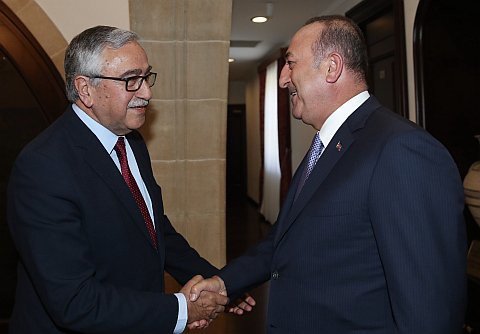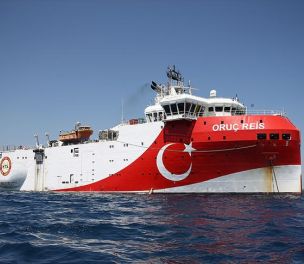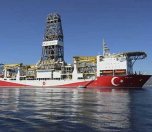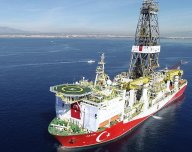* Image: White House official website
Click to read the article in Turkish
Visiting northern Cyprus at the weekend (May 4-5), Minister of Foreign Affairs of Turkey Mevlüt Çavuşoğlu announced that Turkey has started natural gas exploration works with "Fatih Drill Ship" in western Cyprus.
In response to Çavuşoğlu's remarks, the US Department of State also released a written statement regarding the issue on May 5.
Meeting Minister Çavuşoğlu, Northern Cyprus President Mustafa Akıncı also said, "The drill ships have already started their operations. We will continue on our way with the strength that we draw from our rightfulness."

Çavuşoğlu and Akıncı met on May 4 / Photograph: AA
Releasing a statement regarding the statements of both politicians, the US Department of State has released the following statement:
"The United States is deeply concerned by Turkey's announced intentions to begin offshore drilling operations in an area claimed by the Republic of Cyprus as its Exclusive Economic Zone.
"This step is highly provocative and risks raising tensions in the region. We urge Turkish authorities to halt these operations and encourage all parties to act with restraint."
US State Department Spokesperson Morgan Ortagus shared the statement on her official Twitter account as follows:
Turkey's announced intentions to begin offshore drilling operations in an area claimed by Cyprus as its Exclusive Economic Zone is highly provocative & risks raising tensions in the region. We urge Turkish authorities to halt these operations. https://t.co/crjTmlxcdx
— Morgan Ortagus (@statedeptspox) 6 Mayıs 2019
What is Exclusive Economic Zone (EEZ)?An exclusive economic zone (EEZ) is a sea zone prescribed by the United Nations (UN) Convention on the Law of the Sea over which a state has special rights regarding the exploration and use of marine resources, including energy production from water and wind. It is an area which is beyond and adjacent to a country's territorial seas, and extends no more than 200 nautical miles (370 km) out from a country's own coastlines. It can be seen that if the area for EEZ is overlapped and it is still less than 400 nautical miles, then it falls upon the respective states to delineate the actual boundaries of the coastlines. Generally, any point within an overlapping area defaults to the nearest state. Turkey is not a party to this convention for a series of reasons including its conflict with Greece over continental shelf in Aegean Sea. * Sources: Wikipedia, worldatlas.com |
Drilling disagreement started in 2010In December 2010, the Greek Cypriot side unilaterally signed the Continental Shelf Agreement with Israel. After the Greek Cypriots announced that they started drilling activities, Recep Tayyip Erdoğan, the then Prime Minister of Turkey, and Derviş Eroğlu, the then President of Northern Cyprus signed the Continental Shelf Restriction Agreement on September 21, 2011. Since then, the drilling disagreement has been brought into agenda in company with the Cyprus question. |
(PT/SD)









